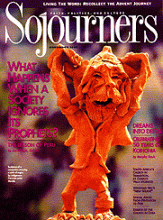Peace activists in Nevada and elsewhere applauded the nine-month moratorium on U.S. nuclear testing signed into law in October, but promised to continue pressing for a comprehensive test ban (CTB). Nine days after President Bush signed the bill, more than 500 people were arrested at the Nevada Test Site in a nonviolent demonstration initiated by the Western Shoshone Indians, on whose land the test site is situated.
"The Nevada Test Site was created illegally in 1951, in violation of Shoshone land rights and the 1863 Treaty of Ruby Valley," said Western Shoshone leader Raymond Yowell. "We never agreed to give our land to the United States. This is Shoshone land. Its use by the United States for nuclear testing is a blatant violation of law and of our civil and property rights."
Organizers of the Nevada event - which drew 2,000 people from 12 countries - hope to sustain pressure for a multinational ban on nuclear tests and for nation-to-nation negotiations with the Western Shoshones. Shortly after the signing of the moratorium, President Boris Yeltsin extended Russia's test ban until July 1993 and urged nuclear powers Britain and China to follow suit.
In the absence of a comprehensive ban, U.S. tests could resume next July at virtually the same rate as before the moratorium. In September then-candidate Bill Clinton endorsed the CTB and said, "I perceive the biggest threat in the future to be...the proliferation of nuclear technology, as well as other weapons of mass destruction, to other countries."
Action toward a comprehensive ban on testing is especially crucial in the next few years because the non-proliferation treaty is due to expire in 1995, and many non-nuclear countries have promised to block its renewal unless the nuclear powers move to ban testing.
Read the Full Article

